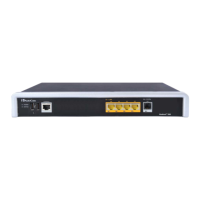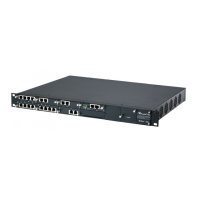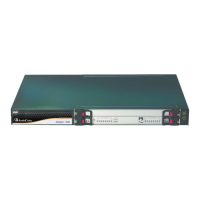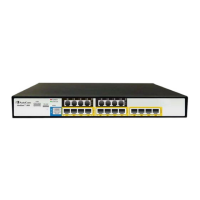Version 7.2 523 Mediant 500L Gateway & E-SBC
User's Manual 24. Routing
Parameter Description
notations, see ''Dialing Plan Notation for Routing and
Manipulation Tables'' on page 999.
By default, no value is defined.
The prefix can include up to 49 digits.
Destination Host Prefix
dst-phone-prefix
[PstnPrefix_DestPrefix]
Defines the Request-URI host name prefix of the incoming
INVITE message.
By default, no value is defined. To denote any prefix, use the
asterisk (*) wildcard.
Action
Destination Type
dst-type
[PstnPrefix_DestType]
Defines the type of Tel destination:
[0] Trunk Group (default)
[1] Trunk
Trunk Group ID
trunk-group-id
[PstnPrefix_TrunkGroupId]
Defines the Trunk Group ID to where the incoming SIP call is
sent.
Trunk ID
trunk-id
[PstnPrefix_TrunkId]
Defines the Trunk to where the incoming SIP call is sent.
Note:
If both 'Trunk Group ID' and 'Trunk ID' parameters are
configured in the table, the routing is done according to the
'Trunk Group ID' parameter.
To configure the method for selecting the trunk's channel to
which the IP call is sent, see the global parameter,
ChannelSelectMode.
IP Profile
ip-profile-id
[PstnPrefix_ProfileName]
Assigns an IP Profile to the call.
To configure IP Profiles, see ''Configuring IP Profiles'' on page
438.
Call Setup Rules Set ID
call-setup-rules-set-id
[PstnPrefix_CallSetupRulesSetId]
Assigns a Call Setup Rule Set ID to the routing rule. The device
performs the Call Setup rules of this Set ID if the incoming call
matches the characteristics of the routing rule. The device routes
the call to the destination according to the routing rule's
configured action, only after it has performed the Call Setup
rules.
To configure Call Setup rules, see ''Configuring Call Setup
Rules'' on page 428.
24.3 Configuring a Gateway Routing Policy Rule
The Routing Policies table lets you edit the default Routing Policy rule. The Routing Policy
is used for Gateway call routing and defines the following:
LDAP server (LDAP Server Group) for LDAP-based call routing (LDAP and/or Call
Setup Rules queries). LDAP-based routing is applicable to Tel-to-IP routing
(''Configuring Tel-to-IP Routing Rules'' on page
509) and IP-to-Tel routing
(''Configuring IP-to-Tel Routing Rules'' on page 518).
Enables Least Cost Routing (LCR), and defines default call cost (highest or lowest)
and average call duration for Tel-to-IP routing rules that are not assigned LCR Cost

